

Liberal Party of Sri Lanka
The Liberal Party began as a think-tank called the ‘Council for Liberal Democracy’, the first institution to criticize the all embracing statism of the colonial and immediate post-colonial periods. In espousing free economic policies together with wide-ranging political freedoms, the Council, and then the Party, opposed both the authoritarian crony capitalism of the United National Party and the socialism of the Sri Lanka Freedom Party. Both major parties are now in theory in favour of wide freedoms, but to ensure that these are understood and entrenched there is still need of coherent Liberal activism.
Strengthening Institutions. I have looked thus far at the Sri Lankan Parliament, and its failure to fulfil properly the essential duties of a Legislature.
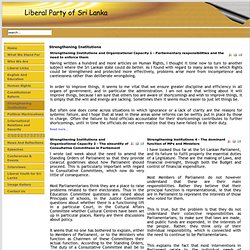
These are the making of Laws, and financial oversight, through both the Budget and control of financial expenditure. Most Members of Parliament do not however understand that these are their main responsibilities. Rather they believe that their principal function is representational, ie that they are in Parliament to represent the interests of those who voted for them. This is true, but the problem is that they do not understand their collective responsibilities as Parliamentarians, to make sure that laws are made, and public funds are expended, in the interests of the people. Rather, they think only of their individual responsibility, which is connected with the need to continue to be Parliamentarians.
Human Rights. National Action Plan for the Protection and Promotion of Human Rights 2011-2016 by Liberal Party Sri Lanka. DRAFT BILL OF RIGHTS - Sri Lanka by Liberal Party Sri Lanka. Sri Lanka : NATIONAL POLICY ON RECONCILIATION: FINAL DRAFT - 2012 by Liberal Party Sri Lanka. Sri Lanka - Rights Watch. Soon after the New Year, the Human Rights Commission summoned a consultation with regard to the recommendations made with regard to Sri Lanka at the Universal Periodic Review conducted by the Human tights Council in Geneva in 2008.
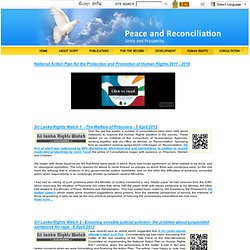
This was a timely move by the Commission, and brought home to me how grossly we had neglected paying formal attention to the recommendations since their inception. We had after all accepted several of the recommendations made, and we had an obligation therefore to carry out our pledges. The fault is mine even more I suppose than that of anyone else, since having been appointed Secretary of the Ministry of Human Rights in the middle of 2008, I continued in that position for well over a year after those pledges had been made.
Though I think I did a little bit, and perhaps more than anyone else would have done, I should obviously have been more systematic. Sri Lanka Rights Watch 15 - The question of torture - 1 May 2012 Read more ... Child Rights. Children’s Homes. A few months back, at the suggestion of the Consortium of Humanitarian Agencies, we arranged consultations on Human Rights at the Reconciliation Office.
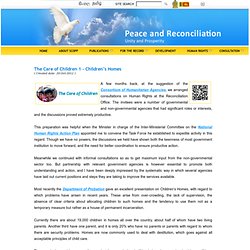
The invitees were a number of governmental and non-governmental agencies that had significant roles or interests, and the discussions proved extremely productive. This preparation was helpful when the Minister in charge of the Inter-Ministerial Committee on the National Human Rights Action Plan appointed me to convene the Task Force he established to expedite activity in this regard. Though we have no powers, the discussions we held have shown both the keenness of most government institution to move forward, and the need for better coordination to ensure productive action. Meanwhile we continued with informal consultations so as to get maximum input from the non-governmental sector too. Most recently the Department of Probation gave an excellent presentation on Children’s Homes, with regard to which problems have arisen in recent years.
Children in Court. Following the consultation at which the Probation Department produced an illuminating note about Children’s Homes, members of the contract group worked out suggestions to prevent what might be termed SECONDARY VICTIMISATION OF children brought before the courts.
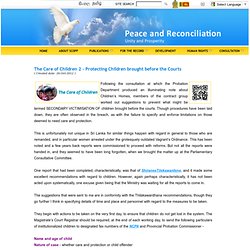
Though procedures have been laid down, they are often observed in the breach, as with the failure to specify and enforce limitations on those deemed to need care and protection. This is unfortunately not unique in Sri Lanka for similar things happen with regard in general to those who are remanded, and in particular women arrested under the grotesquely outdated Vagrant’s Ordinance. This has been noted and a few years back reports were commissioned to proceed with reforms.
But not all the reports were handed in, and they seemed to have been long forgotten, when we brought the matter up at the Parliamentary Consultative Committee. Learning English. This section is intended to help people who wish to improve their knowledge of English, and to find learning materials for children as well as other students.
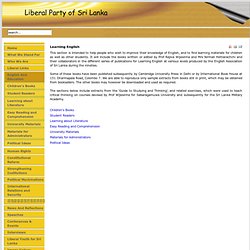
It will include the books written or edited by Prof Rajiva Wijesinha and Mrs Nirmali Hettiarachchi and their collaborators in the different series of publications for Learning English at various levels produced by the English Association of Sri Lanka during the nineties. Some of these books have been published subsequently by Cambridge University Press in Delhi or by International Book House at 151 Dharmapala Road, Colombo 7. We are able to reproduce only sample extracts from books still in print, which may be obtained from booksellers. The other books may however be downloaded and used as required. Children's Books Student Readers Learning about Literature.
Easy Reading and Comprehension. This section includes material that was intended to promote reading for pleasure, at a time when there were few books for adult readers that used a limited vocabulary and simple constructions that would have made comprehension easy.
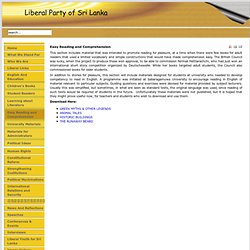
The British Council was lucky, when the project to produce these won approval, to be able to commission Nirmali Hettiarachchi, who had just won an international short story competition organized by Deutschewelle. While her books targeted adult students, the Council also commissioned books for older students. Historic Buildings by Liberal Party. Animal Tales by Liberal Party. The Runaway Beard by Liberal Party. Learning about Literature. This section includes books published by the Sabaragamuwa University Press, with assistance from the English Association of Sri Lanka and the Canadian International Development Agency, to support its English degree programme.
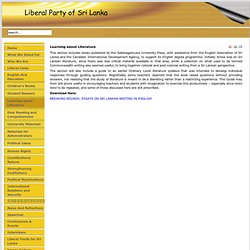
Initially stress was on Sri Lankan literature, since there was less critical material available in that area, while a collection on what used to be termed Commonwealth writing also seemed useful, to bring together colonial and post-colonial writing from a Sri Lankan perspective. The section will also include a guide to an earlier Ordinary Level literature syllabus that was intended to develop individual responses through guiding questions.
Regrettably some teachers objected that the book raised questions without providing answers, not realizing that the study of literature is meant to be a liberating rather than a restricting experience. Breaking Bounds: Essays on Sri Lankan Writing in English. University Materials. Document not available. Geography by Liberal Party. Student Readers. This section consists of several books produced by the English Association of Sri Lanka when new programmes in English at university level began with the opening of Affiliated University Colleges.
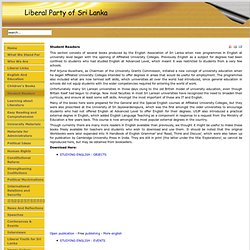
Previously English as a subject for degrees had been confined to students who had studied English at Advanced Level, which meant it was restricted to students from a very few schools. Prof Arjuna Aluwihare, as Chairman of the University Grants Commission, initiated a new concept of university education when he began Affiliated University Colleges intended to offer degrees in areas that would be useful for employment.
The programmes also included what are now termed soft skills, which universities all over the world had introduced, since general education in schools did not equip students with the wider competencies required for entering the world of work. Download Here: Studying English: Business and Administration by Liberal Party. Read, Think and Discuss by Liberal Party. Studying English: Objects by Liberal Party. Studying English: Events by Liberal Party. Studying English: People by Liberal Party. Children's Books. This section consists of several books produced by the English Association of Sri Lanka at a time when few English language books were produced in Sri Lanka.
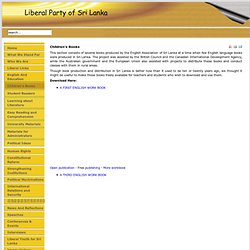
The project was assisted by the British Council and the Canadian International Development Agency, while the Australian government and the European Union also assisted with projects to distribute these books and conduct classes with them in rural areas. Though book production and distribution in Sri Lanka is better now than it used to be ten or twenty years ago, we thought it might be useful to make these books freely available for teachers and students who wish to download and use them.
Download Here: Key Words in English - 1 by Liberal Party. More Key Words in English - 2 by Liberal Party. More Fun With Sounds - Learning English 2 by Liberal Party. A First English Workbook by Liberal Party. A Third English Workbook by Liberal Party. A FOURTH ENGLISH WORK BOOK by Liberal Party. Junior English Textbook (Sample) by Liberal Party. Administrators - Elements of Governance. Political Ideas. Constitutional Reform. Some years back the Council for Liberal Democracy produced an influential book called 'Ideas for Constitutional Reform', edited by Chanaka Amaratunga.
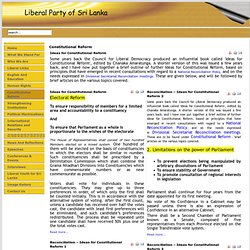
A shorter version of this was issued a few years back, and I have now put together a brief outline of further Ideas for Constitutional Reform, based on principles that have emerged in recent consultations with regard to a National Reconciliation Policy, and on the needs expressed in Divisional Secretariat Reconciliation meetings. These are to be found under Constitutional Reform - brief articles on the various topics covered. 1.Electoral Reform. Ideas for Constitutional Reform.
Electoral Reform To ensure responsibility of members for a limited area and accountability to a constituency And To ensure that Parliament as a whole is proportionate to the wishes of the electorate. Coherence about Legislation. Ensuring greater coherence about legislation. Judicial Accountability. Judicial Accountability The last section I had planned to look at in this series is the Judiciary, though that may be the most important in the current context.
The basic suggestions I put forward some weeks back, before the crisis had got so grave, basically addressed problems that were developing precisely because we were confused about two principles that all constitutional dispensations should hold sacred. The Cabinet of Ministers. The Cabinet of Ministers Over the last 25 years the idea of Cabinet government has become a joke. I suspect this was the intention of J R Jayewardene when he imposed an Executive Presidency on a Westminster style system of Cabinet government. In no other country in the world in which the Constitution is a serious document is there an Executive President who has to select his Cabinet from amongst Members of Parliament who continue thus to serve in a dual role. And I should add to this that, in the Westminster system, where all Ministers are Members of Parliament, there is provision generally for additional talent to be included through a Second Chamber – as we see illustrated so effectively in India today.
The problems of a large Cabinet. Sign Petition - Introduce Constitutional Amendment limiting Cabinet to 20 Ministers. The Functions of the Cabinet. Limtations on Power of Parliament. Some years back the Council for Liberal Democracy produced an influential book called 'Ideas for Constitutional Reform', edited by Chanaka Amaratunga. A shorter version of this was issued a few years back, and I have now put together a brief outline of further Ideas for Constitutional Reform, based on principles that have emerged in recent consultations with regard to a National Reconciliation Policy, and on the needs expressed in Divisional Secretariat Reconciliation meetings. These are to be found under Constitutional Reform - brief articles on the various topics covered. 2. Promoting Consultation in Parliament. Promoting consultation in Parliament I promised to return to the subject, since I did not spend much time on discussing Committees of Parliament.
These should be extremely important, since they should be the principal forums in which Parliament discharges its two vital responsibilities, namely legislation and financial oversight. Assessing Parliament. While I continue to believe improving consultation as well as efficiency at local level should be the most important priority for government, I will interrupt the discussion of appropriate mechanisms for this briefly, to look at a very interesting initiative that was publicized recently. Manthri.lk – Sri Lanka's Pioneering Parliamentary Monitoring Website. Consultative Committees. Establishment of Consultative Committees to formulate policy and monitor executive action.
Consultative Committees helping Executive. Constituting Constructive Consultative Committees I wrote last week about Parliamentary Consultative Committees and the role they should play with regard to legislation. But there is more that they should do, in helping the Executive develop policies and monitor their implementation. Electoral Reform. Local Govt Councils. Local Government Councils. Provincial Assemblies. Sri Lanka : NATIONAL POLICY ON RECONCILIATION: FINAL DRAFT - 2012 by Liberal Party Sri Lanka. Divisional Sectatariat Reconciliation Meetings. Sign Petition - Introduce Constitutional Amendment limiting Cabinet to 20 Ministers. The problems of a large Cabinet.